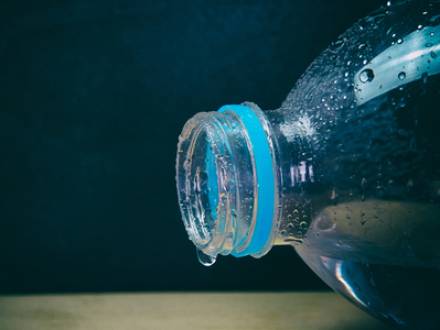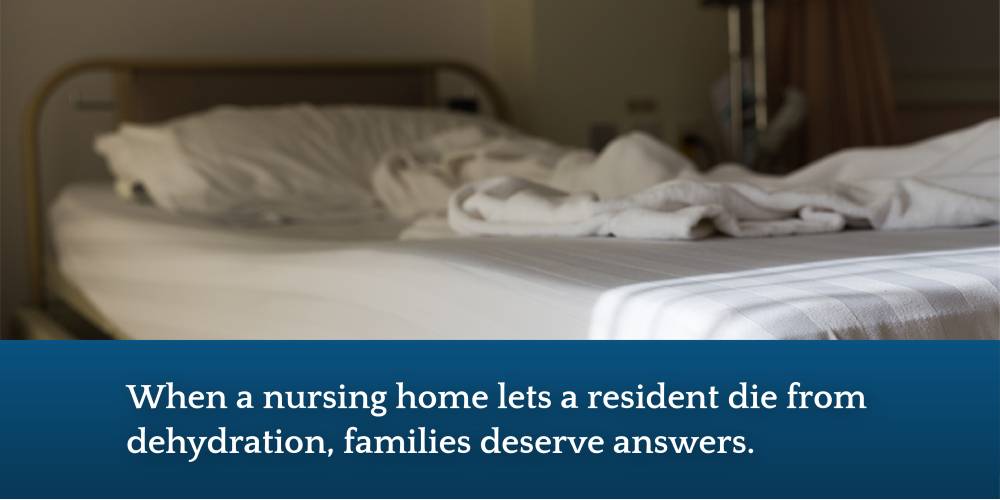Can Dehydration Kill an Elderly Person in a Nursing Home?
 Dehydration may sound like something simple that happens on a hot day, but for elderly nursing home residents it can be deadly. Seniors are more vulnerable to dehydration because of health conditions, medications, or limited mobility. When a nursing home does not pay very close attention to its residents’ needs, dehydration can turn into a life-threatening emergency.
Dehydration may sound like something simple that happens on a hot day, but for elderly nursing home residents it can be deadly. Seniors are more vulnerable to dehydration because of health conditions, medications, or limited mobility. When a nursing home does not pay very close attention to its residents’ needs, dehydration can turn into a life-threatening emergency.
Every year, beloved grandparents and parents lose their lives from totally preventable dehydration simply because some nursing homes abuse or neglect patients. When nursing home residents and their families have been wronged so terribly, we believe the facilities that are at-fault should pay a price.
If your loved one died from dehydration in an Illinois nursing home, it is important to know that you may have legal options. At our firm, experienced Winnebago County nursing home wrongful death attorneys handle tragic nursing home fatality cases with sensitivity and care. We offer free consultations, and clients always speak directly with a real lawyer, not an intake service. Do you have suspicions about how your loved one died in a nursing home? Listen to that hunch and call us today. We are ready to hear your story.
How Does Dehydration Happen in a Nursing Home?
Many elderly residents need nursing home staff to help them drink water, especially if they are bedridden or have dementia. Dehydration can happen quickly when staff do not remind or help residents to drink water or other fluids often. When residents cannot reach cups or water bottles on their own, or get up out of bed to ask for help, nursing home staff should regularly check in to make sure residents are staying hydrated.
Certain medications can cause dehydration very quickly. If doctors, nurses, and support staff do not account for the impact of medication on a patient’s fluid levels, a medicine that is meant to help can cause more harm than good.
Nursing home residents are also more immunocompromised than most people and may catch germs that give them diarrhea or infections. Diarrhea is one of the leading causes of global death, largely due to dehydration. Even without diarrhea, patients with serious infections need more fluids to help their bodies heal and recover.
Whatever the cause, nursing home staff should not only be making sure residents take in enough fluids, but should also be on the lookout for signs of dehydration. These include dry mouth, confusion, or low urine output. When these signs are ignored because staff are too busy or are careless with their rounds, patients can suffer the worst outcomes imaginable.
Can Dehydration Be Fatal in Nursing Homes?
Severe dehydration can definitely lead to very serious and sometimes fatal conditions. Kidney failure, shock, seizures, and even strokes can be a result of not getting enough fluid. Older adults are at higher risk because their bodies hold less water and their sense of thirst is often weaker. In a nursing home setting, this makes regular monitoring and staff attention even more important.
According to the Illinois Nursing Home Care Act (210 ILCS 45), nursing home facilities are legally required to provide adequate and properly supervised nursing care. Ignoring this duty and failing to ensure residents receive enough fluids may be considered neglect, and if it leads to death, the facility could be held liable. This means your odds of succeeding in a lawsuit could be quite strong.
Signs of Neglect in Nursing Home Dehydration Cases
Not every case of dehydration in a nursing home is automatically a sign of neglect. Some residents have medical conditions that make fluid balance more difficult to maintain. However, there are warning signs that should raise concern for families.
For example, if medical records show repeated episodes of dehydration, this may indicate that the staff are not monitoring your loved one’s needs properly. Chronic staffing shortages can also leave residents without the supervision they need to ensure they are drinking enough fluids throughout the day. Families may hear reports of residents asking for water and being ignored, or they may notice unexplained weight loss, recurring urinary tract infections, or sudden confusion, all of which can be signs of dehydration.
When these red flags appear, it could mean the facility has failed in its duty of care. If dehydration contributes to a resident’s death, surviving family members may also pursue a wrongful death claim under the Illinois Wrongful Death Act (740 ILCS 180). These claims not only provide compensation for families but also hold facilities accountable for dangerous patterns of neglect.

What Legal Action Can Families Take if a Parent or Grandparent Dies in a Nursing Home?
Families who lose a loved one to dehydration in a nursing home can pursue several types of compensation. These include the medical expenses of caring for the deceased before they died, such as resuscitative care, ambulance transport, and life-saving treatment.
Funeral and burial costs are also commonly recovered. If an elderly person was otherwise healthy and was likely to live considerably longer had the dehydration not tragically cut their life short, families may be able to recover loss of companionship and support as well.
These cases also hold facilities accountable, helping prevent other families from suffering the same tragedy. Our firm focuses on nursing home cases, and we know how to investigate medical records, staffing levels, and state inspections to build a strong claim.
Even if you are not certain that your parent or grandparent died because of abuse or neglect, these cases are worth talking to an attorney about. In the very least, you may feel comforted to learn that the death could not have been prevented and the nursing home gave your loved one the care they needed. But if the nursing home was neglecting or abusing your loved one, you deserve to know this so you can do something about it.
Contact a St. Clair County, IL Nursing Home Fatality Lawyer
If you believe dehydration caused your loved one’s death in a nursing home, act now. At Schwartz Injury Law, our Winnebago County nursing home injury lawyers have years of experience with serious cases of abuse, neglect, and wrongful death. We provide free consultations, and when you call, you will speak with a real attorney who understands the pain your family is going through. We will not put you through a call service or make you wait to get answers. Call 312-535-4625 today to learn how we can help.

 312-535-4625
312-535-4625





